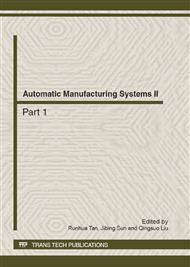[1]
Byung Joo Park, Hyung Rim Choi, Hyun Soo Kim, A hybrid genetic algorithm for the job shop scheduling problems, Computers & Industrial Engineering, Vol. 45 (2003), pp.597-613
DOI: 10.1016/s0360-8352(03)00077-9
Google Scholar
[2]
Chao Yong Zhang, PeiGen Li, YunQing Rao, ZaiLin Guan, A very fast TS/SA algorithm for the job shop scheduling problem, Computers & Operations Research, Vol.35 (2008), pp.282-294
DOI: 10.1016/j.cor.2006.02.024
Google Scholar
[3]
Tsung-Lieh Lin et al., An efficient job-shop scheduling algorithm based on particle swarm optimization, Expert Systems with Applications, Vol.37 (2010), pp.2629-2636
DOI: 10.1016/j.eswa.2009.08.015
Google Scholar
[4]
J. Heinonen et al., Hybrid ant colony optimization and visibility studies applied to a job-shop scheduling problem, Applied Mathematics and Computation, Vol.187 (2007), p.989–998
DOI: 10.1016/j.amc.2006.09.023
Google Scholar
[5]
Holland, J. H. Adaption in natural and artificial systems. Ann Arbor: The University of Michigan Press, (1975)
Google Scholar
[6]
Davis L. Job shop scheduling with genetic algorithms. Proceedings of the first International Conference on Genetic Algorithms (1985), pp.136-140
Google Scholar
[7]
Leila Asadzadeh, Kamran Zamanifar, An agent-based parallel approach for the job shop scheduling problem with genetic algorithms, Mathematical and Computer Modelling, Vol.52 (2010), pp.1957-1965
DOI: 10.1016/j.mcm.2010.04.019
Google Scholar
[8]
Ren Qing-dao-er-ji, Yuping Wang, A new hybrid genetic algorithm for job shop scheduling problem, Computers & Operations Research, Vol.39 (2012), pp.2291-2299
DOI: 10.1016/j.cor.2011.12.005
Google Scholar
[9]
Goncalves, J. F., Mendes, J. J. D. M., & Resende, M. G. C. A hybrid genetic algorithm for the job shop scheduling problem, European Journal of Operational Research, Vol.167 (2005), p.77–95
DOI: 10.1016/j.ejor.2004.03.012
Google Scholar
[10]
Beasley, D., Bull, D.R., Martin, R.R., An overview of genetic algorithms: Part 1, Fundamentals, University Computing, vol.15 (1993), p.58–69
Google Scholar
[11]
Runwei Cheng, A tutorial survey of job-shop scheduling problems using genetic algorithms, part II: hybrid genetic search strategies, Computers & Industrial Engineering, Vol.36 (1999), pp.343-364
DOI: 10.1016/s0360-8352(99)00136-9
Google Scholar
[12]
Arno Sprecher, Rainer Kolisch, Andreas Drexl, Semi-active, active, and non-delay schedules for the resource-constrained project scheduling problem, European Journal of Operational Research, Vol.80 (1995), pp.94-102
DOI: 10.1016/0377-2217(93)e0294-8
Google Scholar
[13]
Talip Kellegöz, Bilal Toklu, John Wilson, Comparing efficiencies of genetic crossover operators for one machine total weighted tardiness problem, Applied Mathematics and Computation, Vol.199 (2008), pp.590-598
DOI: 10.1016/j.amc.2007.10.013
Google Scholar
[14]
Bierwirth, C., Mattfeld, D., & Kopfer, H. In H. M. Voigt (Ed.), On permutation representations for scheduling problems, Proceedings of Parallel Problem Solving from Nature IV, Berlin, Germany: Springer (1996), pp.310-318
DOI: 10.1007/3-540-61723-x_995
Google Scholar
[15]
Andreas C Nearchou, The effect of various operators on the genetic search for large scheduling problems, International Journal of Production Economics, Vol.88 (2004), pp.191-203
DOI: 10.1016/s0925-5273(03)00184-1
Google Scholar


